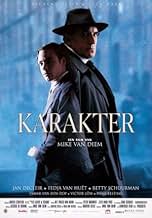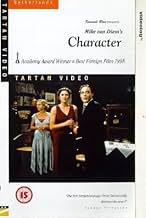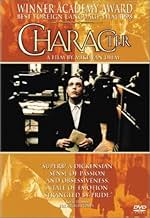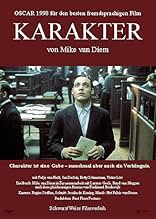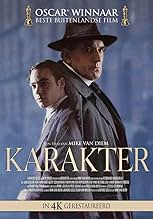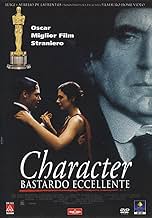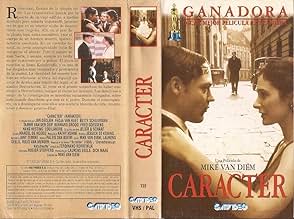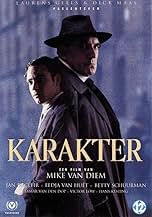ÉVALUATION IMDb
7,7/10
12 k
MA NOTE
Ajouter une intrigue dans votre langueJacob Katadreuffe lives mute with his mother, has no contact with his father who only works against him and wants to become a lawyer, at all costs.Jacob Katadreuffe lives mute with his mother, has no contact with his father who only works against him and wants to become a lawyer, at all costs.Jacob Katadreuffe lives mute with his mother, has no contact with his father who only works against him and wants to become a lawyer, at all costs.
- A remporté 1 oscar
- 18 victoires et 7 nominations au total
Avis en vedette
Character is one of the best period films I have ever seen, and the enormous quantity of very interesting aspects in it make it worth watching.
I saw this film with the natural curiosity that a best foreign film Academy Award arouses in many people, and I was really delighted and surprised (Altough, I must admit I had hoped Spain's Secrets of the Heart would win). The story is quite beautiful, and Mike van Diem created a very solid screen play based on well known Ferdinand Bordewijk's novel.
The film has some extraordinary moments; I must say that the one that impressed me most was the final scene of the film, a scene of great visual impact and also of an incredibly big narrative content; it is the scene that reveals the mystery behind the cruel A.B. Dreverhaven's behaviour.
The performances given out in this film are simply spectacular especially Jan Decleir's as Dreverhaven. I also think Betty Schuurman as Jacob's mother and Victor Löw as De Gankelaar are terrific. One more thing, the art design is beautiful; the image the film gives us of the 1930's Amsterdam is very powerful and very beautiful.
Not only is it a great film then, but it is a story that carries a lot of feelings, and will take you on quiet an emotional ride. I can only say this: enjoy it!
I saw this film with the natural curiosity that a best foreign film Academy Award arouses in many people, and I was really delighted and surprised (Altough, I must admit I had hoped Spain's Secrets of the Heart would win). The story is quite beautiful, and Mike van Diem created a very solid screen play based on well known Ferdinand Bordewijk's novel.
The film has some extraordinary moments; I must say that the one that impressed me most was the final scene of the film, a scene of great visual impact and also of an incredibly big narrative content; it is the scene that reveals the mystery behind the cruel A.B. Dreverhaven's behaviour.
The performances given out in this film are simply spectacular especially Jan Decleir's as Dreverhaven. I also think Betty Schuurman as Jacob's mother and Victor Löw as De Gankelaar are terrific. One more thing, the art design is beautiful; the image the film gives us of the 1930's Amsterdam is very powerful and very beautiful.
Not only is it a great film then, but it is a story that carries a lot of feelings, and will take you on quiet an emotional ride. I can only say this: enjoy it!
It is not too frequent that we get Dutch programmes of films or TV-minis in this corner of Europe, and when they do appear it is thanks to the regional Basque TV Station `EITB'. Indeed over two years has passed since seeing the excellent mini `Charlotte Sophie Bentinck' (1996) (qv) and seeing the very interesting `Karakter' recently.
Set in the 1920's this film has excellent mise-en-scéne wonderfully photographed, mostly in Holland and Belgium, but with some scenes shot in Wroclaw, Poland, with street-cars of the times, in which the darkened almost greyish brickwork of the tenement buildings and the industrial port areas takes on an intense protagonism in the film's development. Palais van Boem's musical contribution is mostly just right, though at times seemed to be a little boorish.
A young, illegitimate boy grows up with his unmarried mother, whilst the father, Dreverhaven, continuously appeals to her to marry him, but always rejected. However, the father seems to do everything possible to disrupt the young man's life, as his mother becomes more and more detached and uncaring. It would seem that Dreverhaven is playing out a real-life game of chess around his son Jacob, as if trying to corner him into submission and apathy, but which the young man manages to survive. The psychological impression is that one or the other would undo his `bitter foe', but that despite the father's vast fortune and power the struggle of will would rebound against him.But as the Dutch saying goes: De één zijn dood, is de ander zijn brood'
This is no `thriller' in the ordinary sense, more a psychological suspense which requires attention throughout. The acting is magnificent: both Fedja van Huêt and Jan Decleir play out their parts with just the right touch, especially Decleir, and Lou Landré as Rentenstein is almost spellbinding, not to be missed.
Here is another example of the unarguable fact: here in Europe we make cinema, not blockbuster box-office hits.
Set in the 1920's this film has excellent mise-en-scéne wonderfully photographed, mostly in Holland and Belgium, but with some scenes shot in Wroclaw, Poland, with street-cars of the times, in which the darkened almost greyish brickwork of the tenement buildings and the industrial port areas takes on an intense protagonism in the film's development. Palais van Boem's musical contribution is mostly just right, though at times seemed to be a little boorish.
A young, illegitimate boy grows up with his unmarried mother, whilst the father, Dreverhaven, continuously appeals to her to marry him, but always rejected. However, the father seems to do everything possible to disrupt the young man's life, as his mother becomes more and more detached and uncaring. It would seem that Dreverhaven is playing out a real-life game of chess around his son Jacob, as if trying to corner him into submission and apathy, but which the young man manages to survive. The psychological impression is that one or the other would undo his `bitter foe', but that despite the father's vast fortune and power the struggle of will would rebound against him.But as the Dutch saying goes: De één zijn dood, is de ander zijn brood'
This is no `thriller' in the ordinary sense, more a psychological suspense which requires attention throughout. The acting is magnificent: both Fedja van Huêt and Jan Decleir play out their parts with just the right touch, especially Decleir, and Lou Landré as Rentenstein is almost spellbinding, not to be missed.
Here is another example of the unarguable fact: here in Europe we make cinema, not blockbuster box-office hits.
10pedrito
In this film we are confronted with a perfect script if there ever was one! Once again, talented screenwriters have proved that a fine novel can be transformed into a great film, without losing any depth in philosophical understanding or psychological subtlety. In 'Character', the paired tension between pride and guilt, as well as between pride and love, or guilt and love, or love and power, gives birth to an astounding and magnificent lesson in human character and behavior. The fact that Mike van Diem and Laurens Geels, two of the film's three writers, were at the same time -respectively- its director and producer, plays no small role in the success of the script, since the novel by Bordewijk was read -and rewritten- from the perspective of cinema, and not the other way around. The psychological themes are treated as variations in a symphony, presented in one of the characters and later developed in another, or presented in one form and then transmuted into another, as the brilliant treatment given to the self-destructive tendencies in the Dreverhaven character, or the extreme laconism in the mother-son relationship. Seen at a tropical country as Ecuador (my own), surrounded by a teenage audience that was led to expect something else; an audience which was only very slowly won by the tense and restrained 'northern', 'iceberg' pace of the film, 'Character' transformed the screen into a gigantic and painful mirror filled with reflections of the sorrows and sufferings of human nature. And finally those teenagers stopped crunching chips and sipping sodas, and started thinking. A '10' by any standard.
How is it possible for a boy, whose parents are devoid of normal humanity, to grow up to be loved and respected? The film, Character, presents a credible demonstration. It has the darkness of Ingmar Bergman or Charles Dickens, is slow-moving, thoroughly engrossing and it left me emotionally drained, which always elicits a high rating from me.
Dreverhaven is apparently an evil man: a bailiff who is quite willing to evict people in a terrible storm. He embodies two Nietzschean concepts: 1.
the will to power (he entered into power struggles with anyone whom he felt he could dominate) and 2. that a life becomes better by becoming stronger through adversity (he did everything in his power to bring adversity to his son, believing that that would strengthen him--and in many ways it did). His internal struggle between the will to power over his son and his desire to strengthen him is the prime mover of the film; his son's reactions to that are the core. Dreverhaven is also totally fearless; the question arises whether it is caused by bravery or just being tired of life.
The film opens with his son, Jacob Katadreuffe (Fedja van Huêt), coming home, all bloody, only to be arrested as a suspect in the murder of Dreverhaven. He then tells the two interrogators a most amazing story. Since he is describing his own life, one might suspect that he is embellishing the story in his own favour but I believe that he was totally candid.
The story is too complex to dwell on but certain aspects must be mentioned. Jacob's mother, Joba (Betty Schuurman), was a servant to Dreverhaven. On one and only one occasion he may have raped her: it is not made clear if she resisted. As soon as she discovered that she was pregnant, she left him and tried to sever all ties. For a long time, however, Dreverhaven repeatedly proposed marriage and was refused. His motivation is ambiguous (propriety or affection) and Joba was apparently determined not to allow Dreverhaven to beat her in a power struggle.
Because of his Mother's silence, young Jacob believed that she did not like him and, being a pariah because he was illegitimate, he turned to books for solace. Through this he developed a love of learning and a willingness to work hard and he advanced rapidly in a law firm, winning the respect and admiration of most of his colleagues, especially De Gankelaar (Victor Löw), who hired him. De Gankelaar, a man with a huge underbite and a heart to match, became Jacob's mentor, adviser and protector.
Denied access to his son, Dreverhaven began a game of terror against Jacob through legal channels.
The film is a study of character and characters. Their motivations are subtly hidden by consistent and superb acting. In my attempts to understand this dysfunctional family (if it can be called a family) I was forced to think. The slow movement allowed time for that. I want to see the film again, expecting that each viewing will bring a closer understanding. Even the evil Dreverhaven was more an object of pity rather than despicable; his actions were caused more by ignorance of human sensitivities, a dogmatic respect for the law and an unusual philosophy rather than by malice. The film is open-ended. What will Jacob do with the rest of his life?
Dreverhaven is apparently an evil man: a bailiff who is quite willing to evict people in a terrible storm. He embodies two Nietzschean concepts: 1.
the will to power (he entered into power struggles with anyone whom he felt he could dominate) and 2. that a life becomes better by becoming stronger through adversity (he did everything in his power to bring adversity to his son, believing that that would strengthen him--and in many ways it did). His internal struggle between the will to power over his son and his desire to strengthen him is the prime mover of the film; his son's reactions to that are the core. Dreverhaven is also totally fearless; the question arises whether it is caused by bravery or just being tired of life.
The film opens with his son, Jacob Katadreuffe (Fedja van Huêt), coming home, all bloody, only to be arrested as a suspect in the murder of Dreverhaven. He then tells the two interrogators a most amazing story. Since he is describing his own life, one might suspect that he is embellishing the story in his own favour but I believe that he was totally candid.
The story is too complex to dwell on but certain aspects must be mentioned. Jacob's mother, Joba (Betty Schuurman), was a servant to Dreverhaven. On one and only one occasion he may have raped her: it is not made clear if she resisted. As soon as she discovered that she was pregnant, she left him and tried to sever all ties. For a long time, however, Dreverhaven repeatedly proposed marriage and was refused. His motivation is ambiguous (propriety or affection) and Joba was apparently determined not to allow Dreverhaven to beat her in a power struggle.
Because of his Mother's silence, young Jacob believed that she did not like him and, being a pariah because he was illegitimate, he turned to books for solace. Through this he developed a love of learning and a willingness to work hard and he advanced rapidly in a law firm, winning the respect and admiration of most of his colleagues, especially De Gankelaar (Victor Löw), who hired him. De Gankelaar, a man with a huge underbite and a heart to match, became Jacob's mentor, adviser and protector.
Denied access to his son, Dreverhaven began a game of terror against Jacob through legal channels.
The film is a study of character and characters. Their motivations are subtly hidden by consistent and superb acting. In my attempts to understand this dysfunctional family (if it can be called a family) I was forced to think. The slow movement allowed time for that. I want to see the film again, expecting that each viewing will bring a closer understanding. Even the evil Dreverhaven was more an object of pity rather than despicable; his actions were caused more by ignorance of human sensitivities, a dogmatic respect for the law and an unusual philosophy rather than by malice. The film is open-ended. What will Jacob do with the rest of his life?
Karakter is quite stunning on several levels. The cinematography is gorgeous - without the use of any noticeable special effects or surrealistic dream sequences. The quality of the filming surpasses that of most movies.
One of the best things for me (as an American) about watching foreign films is not knowing who most of the actors are, and this makes it easier to completely accept them as the characters they play. The two leads were outstanding, and the supporting characters (particularly Betty Schuurman as Joba, and Nans Kesting as Jan Maan) were very effective.
I found the story to be engrossing and - more than anything, the pacing amazed me. A person accustomed to reading classic novels would probably appreciate the way this film unfolded. There is a desire to reach the end, but no hurry.
For sure, this film wouldn't interest everyone, but I rank it among my favorite films. It deserved to win the Academy Award for Best Picture last year: for the story, for the performances, for the direction ... it's rare that one finds a movie so well-put together.
One of the best things for me (as an American) about watching foreign films is not knowing who most of the actors are, and this makes it easier to completely accept them as the characters they play. The two leads were outstanding, and the supporting characters (particularly Betty Schuurman as Joba, and Nans Kesting as Jan Maan) were very effective.
I found the story to be engrossing and - more than anything, the pacing amazed me. A person accustomed to reading classic novels would probably appreciate the way this film unfolded. There is a desire to reach the end, but no hurry.
For sure, this film wouldn't interest everyone, but I rank it among my favorite films. It deserved to win the Academy Award for Best Picture last year: for the story, for the performances, for the direction ... it's rare that one finds a movie so well-put together.
Le saviez-vous
- AnecdotesAlthough the story takes place in the Dutch city of Rotterdam, many scenes were filmed in other cities across The Netherlands and Europe. This was because Rotterdam has very few buildings from this era left following heavy bombing during the Second World War. Filming locations included: Hamburg (Germany), Wroclaw (Poland), Antwerp and Ghent (Belgium) and The Hague (The Netherlands).
- GaffesIn one of the street scenes, you can see an extra in modern outfit and with no headwear on.
- Citations
Joba: Why don't you leave our boy in peace?
Dreverhaven: I'll strangle him for nine-tenths, and the last tenth will make him strong.
Meilleurs choix
Connectez-vous pour évaluer et surveiller les recommandations personnalisées
- How long is Character?Propulsé par Alexa
Détails
- Date de sortie
- Pays d’origine
- Site officiel
- Langues
- Aussi connu sous le nom de
- Character
- Lieux de tournage
- Wroclaw, Dolnoslaskie, Pologne(Miernicza 27, Wroclaw, Dolnoslaskie, Poland)
- sociétés de production
- Consultez plus de crédits d'entreprise sur IMDbPro
Box-office
- Budget
- 4 500 000 $ US (estimation)
- Brut – États-Unis et Canada
- 623 983 $ US
- Fin de semaine d'ouverture – États-Unis et Canada
- 37 268 $ US
- 29 mars 1998
- Brut – à l'échelle mondiale
- 623 983 $ US
- Durée2 heures 2 minutes
- Couleur
- Mixage
- Rapport de forme
- 1.85 : 1
Contribuer à cette page
Suggérer une modification ou ajouter du contenu manquant



